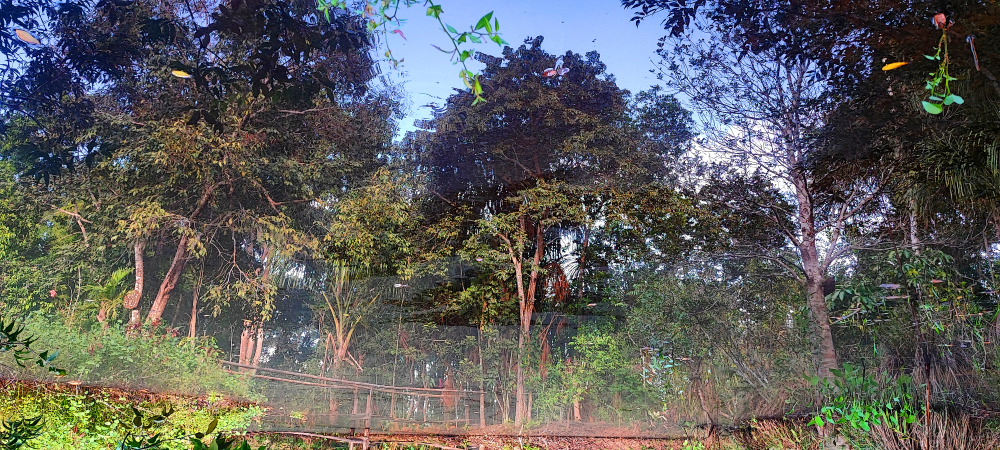Amazonian Cosmologies and Living Technologies: A Conversation with Pedro Favaron
This interview forms part of Koynē Program’s ongoing inquiry into alternative
technologies
and the search for sustainable, reciprocal ways of inhabiting the world.
In July 2025, as part of the Program’s series of research visits, curator Renzo Signori met in the city of Pucallpa with Peruvian researcher, poet, and philosopher Pedro Favaron.
In July 2025, as part of the Program’s series of research visits, curator Renzo Signori met in the city of Pucallpa with Peruvian researcher, poet, and philosopher Pedro Favaron.

The encounter unfolded around questions at the intersection of Amazonian epistemologies, Shipibo-Konibo cosmology, and critical reflections on cybernetic modernity. At the heart of Favaron’s thought lies a proposition both simple and radical: the recognition of a sacred web of life—an ontological and ethical fabric of interconnection among all beings, human and non-human, that predates and surpasses what contemporary discourse calls the Internet of Things.^1
From this perspective, technologies are not limited to digital devices or mechanical artifacts. Rather, they include songs, visions, ritual practices, symbolic designs, and healing techniques cultivated for generations among Indigenous peoples of the Amazon.^2 In particular, the Shipibo-Konibo articulate a worldview where the transmission of knowledge occurs through icaros (chants), kené (geometric designs), and the agency of medicinal plants. These are not symbolic representations but living technologies—performative, multisensory practices that intervene directly in the body, the environment, and the spiritual world.^3
Favaron names this orientation a cosmoethics: an ethics grounded not in utilitarian frameworks or ecological management, but in the acknowledgment of subjectivity and vitality across all beings.^4 If the world is animated by consciousness and breath, then human relations with forests, rivers, animals, and spiritual entities must be conducted on the basis of reciprocity and accountability. This conceptual shift displaces the anthropocentric foundation of Western modernity and opens a horizon where art, ritual, and technology merge in service of healing and balance.
The interview also traced analogies between Indigenous virtualities and contemporary digital environments. Shipibo-Konibo healers, or onaya, are trained to navigate suprasensible realms, moving between multiple ontological dimensions in search of knowledge and therapeutic transformation. Favaron recalls cases where healers “entered” symbolic spaces—comparable to immersive digital worlds—to recover fragmented aspects of a patient’s being.^5 Unlike cybernetic virtuality, oriented toward simulation and consumption, these Indigenous virtualities are inscribed within cosmological and ethical frameworks that prioritize care, responsibility, and restoration.^6
Favaron’s notion of Amazonian Futurism further extends these reflections. Rather than being confined to a mythical past, Indigenous epistemologies project visions of the future that challenge the hegemony of technocratic modernity. In chants received during ritual practice, images of antennas, laboratories, or airplanes may appear—absorbed and re-signified by spiritual experience. These hybrid imaginaries demonstrate that Amazonian cultures are not static but profoundly dynamic, capable of incorporating modern symbols while maintaining a framework of relational ethics.^7 As Favaron argues, this reveals an alternative form of modernity: not linear and homogenizing, but heterogeneous and plural, rooted in ancestral continuity yet oriented toward transformative futures.^8


A key theme that emerges from these perspectives is the performative dimension of language as technology. In Shipibo healing rituals, chants do not simply describe; they transform. They are poetic-technological operations that inscribe vibrational and scented designs upon the body, reordering and cleansing it.^10 The healer’s voice, odor, and bodily discipline are integral to this process, revealing that healing is not an abstract transfer of information but a multisensory reconfiguration of reality. Such insights challenge modern categories of language, which often reduce speech to representation or data, and instead propose a vision of language as a force of world-making.^11
Taken together, these concepts—cosmoethics, Indigenous virtualities, Amazonian futurism, language as technology, and the sacred web of life—offer a profound critique of the limitations of cybernetic modernity. They invite us to imagine technologies beyond domination of a single paradigm, technologies embedded in relational ontologies and committed to the flourishing of all beings. For the Koynē Program, engaging with these epistemologies is not an act of exoticism but a step toward building transmeridional dialogues that can inspire art, research, and practice at the edges of contemporary thought.
- Signori, R. (2025). Interview with Pedro Favaron, Pucallpa, July 2025. NONIIN Magazine, (31).
- Favaron, P. (2018). La semiótica cósmica shipibo-konibo [The cosmic semiotics of the Shipibo-Konibo]. Manuscript.
- Ibid.; Signori, R. (2025). Interview with Pedro Favaron, Pucallpa, July 2025. NONIIN Magazine, (31).
- Favaron, P. (2016). Cosmoética amazónica [Amazonian cosmoethics]. Revista de Crítica Cultural y Antropología, 60(1), 127–149.
- Signori, R. (2025). Interview with Pedro Favaron, Pucallpa, July 2025. NONIIN Magazine, (31).
- Favaron, P. (2016). Cosmoética amazónica [Amazonian cosmoethics]. Revista de Crítica Cultural y Antropología, 60(1), 127–149.
- Favaron, P. (2023). Amazonian Futurism: Summary. Working paper.
- Ibid.
- Favaron, P., & Bensho, C. (2018). La semiótica cósmica shipibo-konibo [The cosmic semiotics of the Shipibo-Konibo]. Manuscript.
- Signori, R. (2025). Interview with Pedro Favaron, Pucallpa, July 2025. NONIIN Magazine, (31).
- Ibid.
© text by Renzo Signori & photos by Arcaica ry
